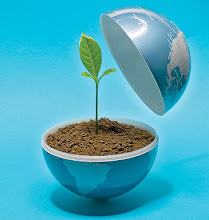
In order for my climate issue to take effect there has to be greenhouse gas concentrations via the greenhouse effect. The greenhouse effect is the process in which the emission of infrared radiation by the atmosphere warms a planet's surface. The warming of the planet’s surface is exactly what global warming is. The greenhouse effect gives off green house gases that could  potentially be dangerous to Earth.
potentially be dangerous to Earth.
The environment and the people are effected greatly. Average temperatures have climbed 1.4 degrees since 1880. The last two decades were the hottest in the last 400 years. The IPCC reports that 11 of the last 12 years are some of the warmest since 1850. Temperatures in the Artic have risen a  t twice the global average. Artic ice is disappearing. The Artic may have its first completely ice free summer by 2040. Polar bears are already suffering form the sea-ice loss.
t twice the global average. Artic ice is disappearing. The Artic may have its first completely ice free summer by 2040. Polar bears are already suffering form the sea-ice loss.  Thaws come a week earlier and freezes come a week later. Coral reefs are under stress. They suffered the worst bleaching ever recorded in 1998. Some areas have seen bleach rates of about 70%. Bleach rates are expected to increase over the next 50 years. The increase in extreme weather events is aided by the
Thaws come a week earlier and freezes come a week later. Coral reefs are under stress. They suffered the worst bleaching ever recorded in 1998. Some areas have seen bleach rates of about 70%. Bleach rates are expected to increase over the next 50 years. The increase in extreme weather events is aided by the
climate change.
Many things could happen in the long run. According to IPCCIntergovernmental Panel on Climate Change) “Global warming could lead to large-scale food and water shortages and have catastrophic effects on wildlife.” Sea levels could rise between 7 and 23 inches and could flood many South Seas islands and swamp parts of  occur more frequently. The ocean’s conveyor belt (global density-d
occur more frequently. The ocean’s conveyor belt (global density-d riven circulation of the oceans) could be permanently altered, which could cause a mini-ice age in
riven circulation of the oceans) could be permanently altered, which could cause a mini-ice age in  water.”(http://news.nationalgeographic.com/news/pf/73625218.html). At http://www.time.com/time/specials/2007/environment there are 51 things you can do to prevent global warming. To see more effects of global warming visit http://en.wikipedia.org/wiki/Effects_of_global_warming .
water.”(http://news.nationalgeographic.com/news/pf/73625218.html). At http://www.time.com/time/specials/2007/environment there are 51 things you can do to prevent global warming. To see more effects of global warming visit http://en.wikipedia.org/wiki/Effects_of_global_warming .
There really were no predictions for global warming. It is an ongoing thing and it just progresses to be worse for us as the time goes by. There are many global warming warnings. Heat waves and periods of unusually warm weather, Ocean warming, sea-level rise and coastal flooding, Glaciers melting, and
There are many people involved with changing the climate. Perhaps the most notable person is Al Gore. Al Gore produced the movie An Inconvenient Truth, which is all about global warming and how humans have impacted it and changed our future. It talks about his travels and how he wants to change the world and explain to everybody the effects of global warming. The band 30 Seconds to Mars is involved in the ice caps melting in
BIBLIOGRAPHY
Wikimedia Foundation, Inc, 3 April 2008
http://en.wikipedia.org/wiki/Positive_feedback
I got the definition of positive feedback from this website.
Wikimedia Foundation, Inc ,14 April 2008,
http://en.wikipedia.org/wiki/Thermohaline_circulation
I got the information about the ocean’s conveyor belt.
Wikimedia Foundation, Inc, 17 April 2008
http://en.wikipedia.org/wiki/Global_warming
All the information about global warming,
National Geographic Society, 1996-2008
http://news.nationalgeographic.com/news/pf/73625218.html
Everything else about global warming.
Wikimedia Foundation, Inc, 17 April 2008
http://en.wikipedia.org/wiki/Greenhouse_effect
1999
http://www.climatehotmap.org/
The warning signs of global warming
Wikimedia Foundation, Inc,18 April 2008
http://en.wikipedia.org/wiki/An_inconvenient_truth
Virgin Records / 30 Seconds To Mars, 2007
http://www.abeautifullie.org/
Pictures:
(1.) Rugby471 ,25 October 2007
http://en.wikipedia.org/wiki/Image:Greenhouse_Effect.svg
http://en.wikipedia.org/wiki/Image:Greenhouse_Gas_by_Sector.png
http://en.wikipedia.org/wiki/Image:Instrumental_Temperature_Record.png
http://en.wikipedia.org/wiki/Image:Retreat_of_the_Helheim_Glacier%2C_Greenland.jpg
http://en.wikipedia.org/wiki/Image:Recent_Sea_Level_Rise.png
http://en.wikipedia.org/wiki/Image:Thermohaline_Circulation_2.png
http://en.wikipedia.org/wiki/Image:Risks_and_Impacts_of_Global_Warming.png

1 comment:
60/60 Excellent, well researched great reflection.
Post a Comment